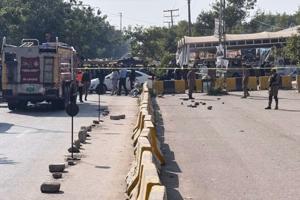World
Suicide Bomber Targets Islamabad Court, Killing 12 and Injuring 27

A suicide bomber detonated explosives outside a district court in Islamabad on October 31, 2023, resulting in the deaths of at least 12 people and injuring 27 others. The attack occurred near a police vehicle at the court’s entrance, as described by Pakistan’s Interior Minister, Mohsin Naqvi. He stated that the attacker attempted to enter the court premises but targeted the police vehicle when unable to do so. Authorities are currently investigating the incident and have confirmed that a suicide bomber was responsible for the blast.
The explosion, which occurred during a busy time when numerous visitors were present for hearings, was powerful enough to be heard from miles away. Initial reports indicated that at least 11 individuals had died, with many casualties being passersby or those attending court appointments. The Islamabad police have not yet made any official comments regarding the incident, as investigations are ongoing.
Context of Ongoing Violence in Pakistan
This bombing comes amid a troubling trend of increasing militant violence in Pakistan, particularly from the resurgent Pakistani Taliban. Just hours before the court attack, Pakistani security forces thwarted an assault on an army-run cadet college in Khyber Pakhtunkhwa. During this incident, a suicide car bomber and five militants attempted to take cadets hostage. The attack began late on October 30, with the bomber trying to breach the facility’s security. Local police chief Alamgir Mahsud reported that two militants were killed by troops, while three managed to infiltrate the compound before being contained.
The Pakistani Taliban, which has been emboldened since the Taliban took control in Afghanistan in 2021, denied involvement in the college attack. This group has been linked to numerous attacks across Pakistan, which has seen a noticeable uptick in violence over recent years. The deadliest assault in recent history occurred in 2014 when Taliban militants killed 154 people, mostly children, at an army-run school in Peshawar.
International Implications and Relations
The rise in violence has strained relations between Pakistan and Afghanistan. Recent tensions escalated following drone strikes on October 9 that resulted in casualties in the Afghan capital. In response, Afghanistan has threatened retaliation. Cross-border fighting has led to numerous deaths, prompting a ceasefire brokered by Qatar on October 19, which is still in effect.
Despite ongoing peace talks, including a recent round in Istanbul, progress remains elusive. The Afghan government has yet to provide assurances that the Pakistani Taliban and other militant groups will not use Afghan territory for attacks against Pakistan. Previous ceasefires between the two nations have collapsed, creating an atmosphere of uncertainty and fear.
As the investigation into the Islamabad bombing continues, the need for effective counter-terrorism strategies in the region is becoming increasingly urgent. The impact of this violence reverberates beyond borders, raising concerns about stability in South Asia and the well-being of its citizens.
-

 Science4 weeks ago
Science4 weeks agoIROS 2025 to Showcase Cutting-Edge Robotics Innovations in China
-

 Lifestyle4 weeks ago
Lifestyle4 weeks agoStone Island’s Logo Worn by Extremists Sparks Brand Dilemma
-

 Politics4 weeks ago
Politics4 weeks agoJudge Considers Dismissal of Chelsea Housing Case Citing AI Flaws
-

 World4 weeks ago
World4 weeks agoBravo Company Veterans Honored with Bronze Medals After 56 Years
-

 Health4 weeks ago
Health4 weeks agoStartup Liberate Bio Secures $31 Million for Next-Gen Therapies
-

 Lifestyle4 weeks ago
Lifestyle4 weeks agoMary Morgan Jackson Crowned Little Miss National Peanut Festival 2025
-

 Science4 weeks ago
Science4 weeks agoArizona State University Transforms Programming Education Approach
-

 Health4 weeks ago
Health4 weeks agoTop Hyaluronic Acid Serums for Radiant Skin in 2025
-

 World4 weeks ago
World4 weeks agoHoneywell Predicts Record Demand for Business Jets Over Next Decade
-

 Sports4 weeks ago
Sports4 weeks agoYamamoto’s Mastery Leads Dodgers to 5-1 Victory in NLCS Game 2
-

 Top Stories4 weeks ago
Top Stories4 weeks agoIndonesia Suspends 27,000 Bank Accounts in Online Gambling Crackdown
-

 Sports4 weeks ago
Sports4 weeks agoMel Kiper Jr. Reveals Top 25 Prospects for 2026 NFL Draft









